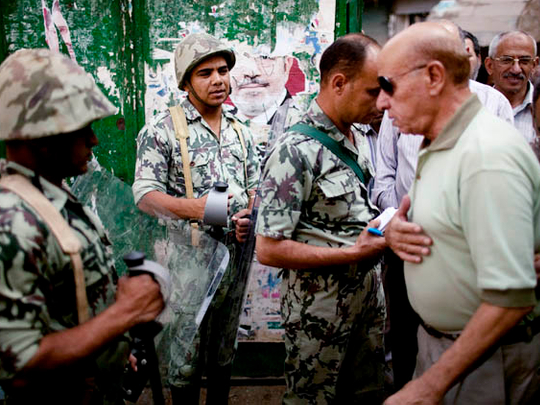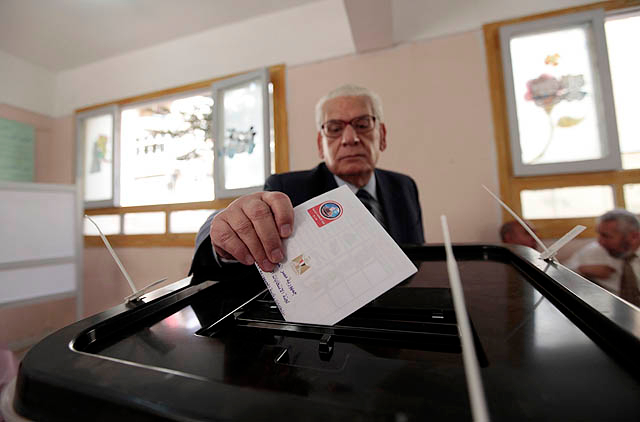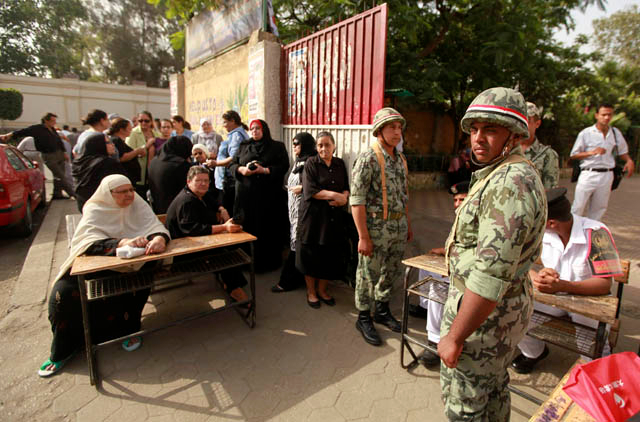
Cairo: Egypt’s military ruler, Field Marshal Hussain Tantawi, on Wednesday monitored the voting process at an army operation room in the Defence Ministry in Cairo, state media reported.
Other members of the ruling military council were touring the country to ensure that the presidential election runs smoothly.
“No irregularity has been reported so far,” said Major General Mohammad Al Assar, a member of the council, as he emerged from a tour of a polling station in Nasr City, eastern Cairo.
However, some non-governmental monitors reported illegal canvassing in Cairo and other governorates by supporters of some presidential candidates, mainly the Muslim Brotherhood’s candidate Mohammad Morsi.
Call to vote for 'independent'
Moderate Islamist Abdul Moneim Abu Al Fotouh, a leading contender in Egypt’s presidential election, has urged Egyptians to vote for an “independent president”.
“I want Egyptians to elect a president who will preserve the nation’s independence and will not bow to domestic or external pressure,” Abu Al Fotouh said after voting in a polling station at a school in the eastern Cairo district of Nasr City on Wednesday.
“The moment of choice has come in which there is no repressive power, military coups or foreign affiliations,” added the 60-year-old candidate.
Queues of voters were seen outside polling stations across Egypt in the country’s first presidential election since long-standing president Hosni Mubarak was deposed in a popular uprising in February last year.
Thirteen candidates are hoping to get an early lead in the polls, including Abu Al Fotouh, who was expelled by the powerful Muslim Brotherhood from its ranks last year after he announced his intention to stand for president in defiance of a ban imposed by the group.
The Brotherhood is running Mohammad Morsi, the head of its Freedom and Justice Party, in the presidential race. He is also a frontrunner.
High turnout
Voters' turnout was high in some areas of Cairo where the Muslim Brotherhood, Egypt’s well-organised group, wields a wide popularity.
“This is a memorable day for me,” said Hassan Abdul Rahman, a pensioner who was waiting to vote in the eastern Cairo district of Hadyek Al Quba. “This is the first time in my life I will vote for a president,” he told Gulf News.
An estimated 50.4 million Egyptians are registered as voters. The army has deployed around 120,000 personnel to secure the polling stations, which will close at 8pm (6pm GMT) before re-opening on Thursday.
With none of the 12 candidates bidding for Egypt's top job expected to win the first round outright, a second round is planned for mid-June.
Polls
According to pollsters, the large number of voters undecided between candidates reflecting radically different trends and the novelty of a free presidential vote make Wednesday's election almost impossible to call.
Among the leading contenders is former foreign minister and Arab League chief Amr Moussa, who is seen as an experienced politician and diplomat but like Ahmad Shafiq, Mubarak's last prime minister, is accused of belonging to the old regime.
The powerful Muslim Brotherhood's candidate Morsi faces competition from Abu Al Fotouh, a former member of the Islamist movement who portrays himself as a consensus choice with a wide range of support.
The next president will inherit a struggling economy, deteriorating security and the challenge of uniting a nation divided by the uprising and its sometimes deadly aftermath, but his powers are yet to be defined by a new constitution.
Read our special coverage of the Egypt elections














